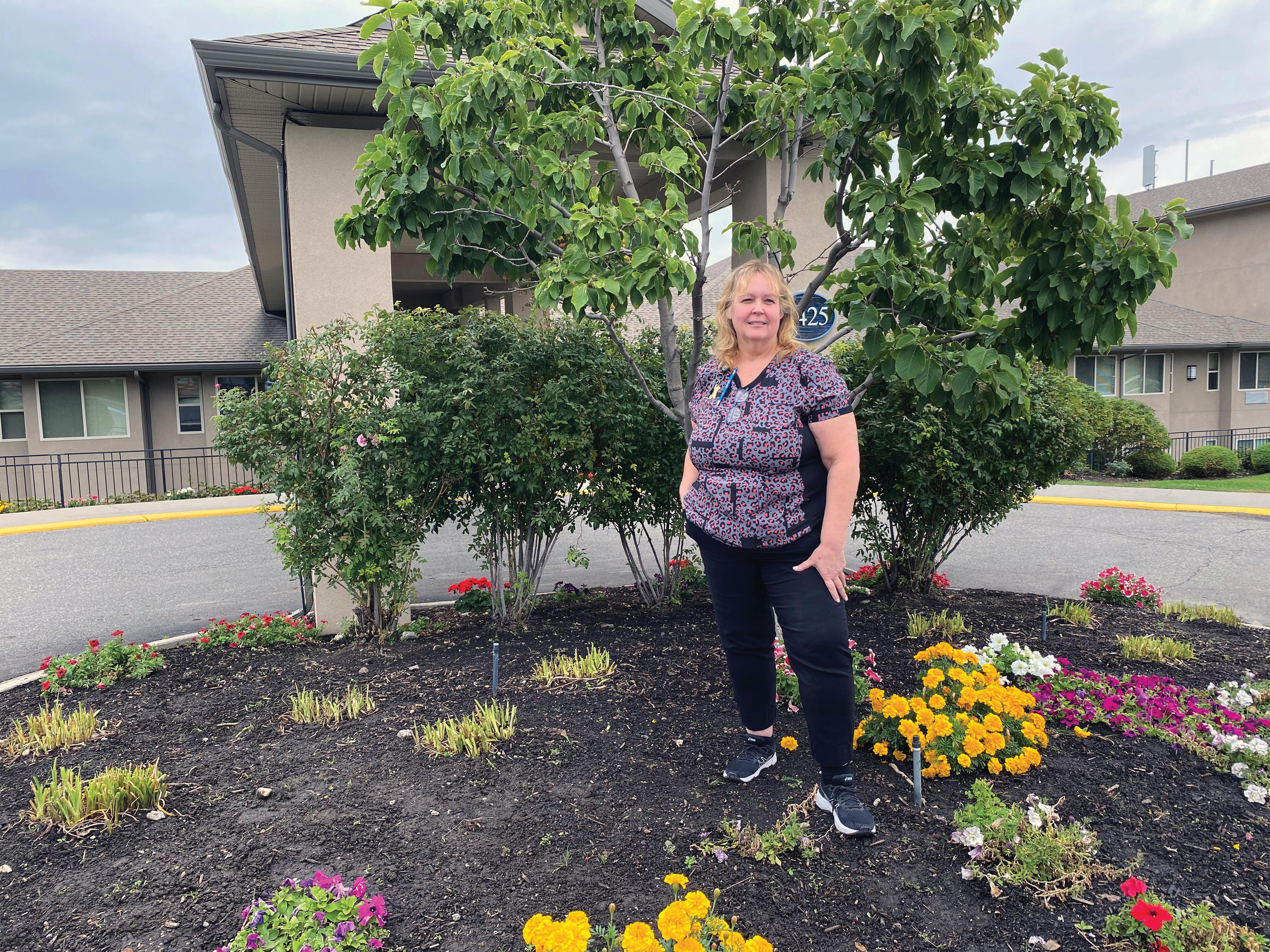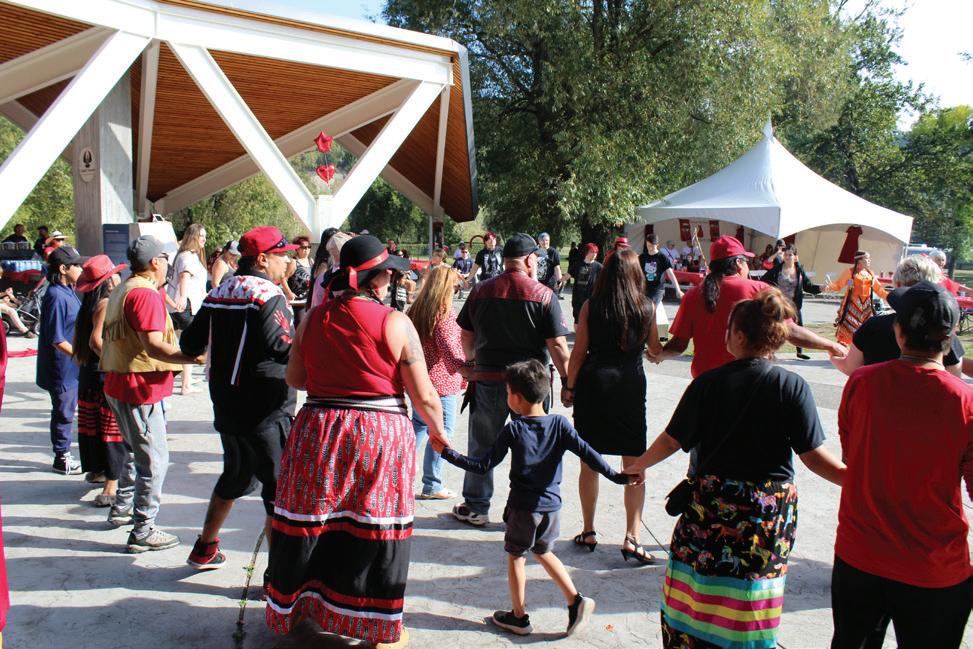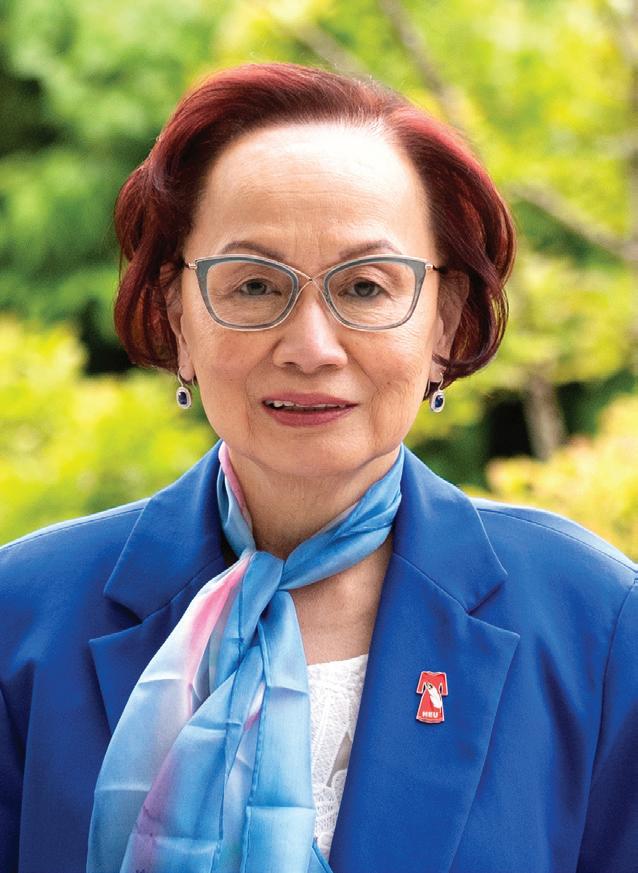
7 minute read
Forced to flee on a moment’s notice
OVER the summer, the widespread evacuations in parts of British Columbia – households, businesses and heath care facilities – affected many HEU members as they escaped the raging wildfires, often with little notice.
Janeth Barker, a primary care assistant at Tumbler Ridge Health Centre, had her outpatient workplace evacuated while she had gone home for lunch.

“I came back to work at 1:30 and on my way, I saw people throwing stuff in their cars and vans,” says Barker. “I thought, ‘oh, well, people must be panicking.’
“When I got to work, the whole building was locked up with an immediate evacuation order.”
Barker rushed back home where her husband was packing up their camper and other belongings — that’s when union solidarity kicked in.
Kim Tricker, a cook at Chetwynd General Hospital, had become friends with Barker at an HEU regional meeting in Prince George.
“Everybody knew that Tumbler was evacuated, and Kim texted me and said she had room for six campers with full hookups,” says Barker. “So, we booted it to Chetwynd, which is about 75 kilo metres away.”
Linda Matthews, a retired HEU housekeeper from Tumbler Ridge, also sought refuge there.
“We stayed on Kim’s property for the week,” says Barker. “It meant a lot because we can only use our camper for two days.
“My three-year-old grandson was with me, so it was quite hectic and stressful, but we all made it work. A couple of my friends who were camping with us followed us to Kim’s house in Chetwynd, so that was nice.”
When evacuees arrived, “Kim and her husband had prepared hotdogs, burgers and salads for us. It was a really beautiful thing to do. They made us feel welcomed and took care of us.”
HEU care aide Krista Zdrill fled work for 24 days, and dealt with detours from a landslide.
Zdrill says her 164 residents ended up at two Kelowna facilities.
“We had residents housed in dining rooms and the activity room,” says Zdrill. “It’s never an ideal situation because you’ve got dementia residents who need to be in a locked area.

“And you’ve got mattresses stacked on the floor with 90-year- and expect things to be smooth, but I have to say there weren’t many hiccups. I think it has to do with the fact we were out two years ago as well, so we learned from that process what worked.”
Barker and Zdrill say they’re grateful for HEU’s Disaster Relief Fund, which helped cover some of their expenses.
As the climate crisis deepens, HEU will keep advocating for sup-
Stolen sisters honoured
Each October, local groups organize community events as part of the national Red Dress Campaign to raise awareness of missing and murdered Indigenous women, girls, and two-spirit people.

In recent years, HEU members in Prince George and Surrey have collaborated with community and local Indigenous leaders to organize powerful Red Dress gatherings.
For tips on event planning, check out HEU’s Red Dress toolkit at heu.org/red-dress-toolkit.
Head of the class
More than 150 HEU members gathered last June for the union’s first Summer School since the pandemic.

Under the theme of “Strengthening Connections and Organizing for Power,” members spent a week building their skills through four different streams: Take Back the Work Floor; Organizing for Health, Safety and Well-Being at Work; Organizing for Political Action; and Popular Theatre.
Throughout the week, members also heard from speakers including community and HEU local leaders, and elected provincial representatives.
Holding The Line
WITH their enthusiasm for protecting workers’ rights and deep expertise on union matters, HEU servicing representatives are the frontline support for locals. Reps help file grievances, advise stewards and activists, support bargaining, prepare for arbitration hearings, and interpret collective agreement language. Many reps come from HEU’s membership and know the health care workplace well. Shown here are some of the hardworking HEU staff on the Vancouver Coastal team.
As we get ready to head to the polls for next year’s provincial election, I’ve been reflecting on how governments directly impact HEU members’ lives.
AUTUMN is often a time of reflection. I reflect on the year behind and what’s ahead.
I recently spoke at a meeting for HEU equity standing committee members. Seeing both new and familiar faces, I realized how far we’ve advanced to be more


As an HEU member, activist and leader, I’m proud of the many gains our union has championed over the years – achievements made possible through collective bargaining, convention resolutions and constitutional amendments, political action, policy and legislative reforms. While our union prepares to celebrate its 80th anniversary – and we head to the polls for next year’s provincial election – I’ve been reflecting on how governments directly impact HEU members’ lives.
HEU’s history entwined with B.C. politics
Let’s go back to the 1950s. For 20 years, the Social Credit government, led by W.A.C. Bennett, cut hospital services and jobs, froze and slashed wages. Labour retaliated with job actions and strikes.
With BC NDP Premier Dave Barrett’s 1972 election victory, we saw the Labour Relations Board created, welfare system reforms, and an expanded public sector, among other improvements.
But that was short-lived.
Bill Bennett’s Socreds, elected in 1975, repealed labour laws; cut funding to education, health and social services, and introduced numerous bills to strip away tenants’, labour and human rights. It led to a general strike.
Fast forward to 1991 when the BC NDP returned to office. Labour rights were strengthened. Pay equity adjustments were realized. Private sector health workers were brought into the facilities contract.
HEU pioneered same-sex partner benefits, organized Indigenous health workers, and negotiated the Health Labour Accord, which led to a shorter workweek and employment security provisions.
Labour-friendly governments support workers

But in 2001, the BC Liberals took office, launching a 16-year attack on public services and workers. We all know the story of Bills 29, 37 and 94 – the massive privatization and job loss – mostly targeted at women and workers of colour. We never stopped fighting for justice.
Today, more than 4,000 HEU contracted support services workers have been repatriated into the public sector – a BC NDP election promise. With a labour-friendly government who values workers and public services, we negotiated substantial public sector contracts. Anti-labour laws were repealed. Workers in seniors’ care saw their paycheques balloon with wage-levelling. And we did that by working together.
We were there to put our bodies on the line to protect the rights and freedoms of our members, and the marginalized people in our communities.
I PRIDE myself on being a strong, confident woman with the courage to promote and defend human rights.

But I am deeply impacted by attending a recent protest.
I was in Ottawa for CUPE National meetings when demonstrations were held across Canada to dispute sexual orientation and gender identity (SOGI) being taught in schools.
The anti-SOGI side argues that children learning about diversity and inclusivity infringes on parental rights, and may influence children’s beliefs. They also don’t support children’s right to determine their own pronouns without parental consent.
But this hinders children’s self-expression, provokes shame and fear, and makes trans children feel invisible. It also makes them a target for bullying.
I’ve never attended a public event like this
Along with other CUPE National leaders and friends, we carried a banner in solidarity of trans rights and led the march to Parliament Hill. I held the flank to prevent protesters from crossing our line.
I’ve never attended a public event like this.
It wasn’t a united rally where we gather en masse to protest government legislation, employer policies, social injustices, or global human rights violations.
This was a hate rally that demanded our counter protest.
Hundreds of protesters, including many children, were on the Parliament lawn awaiting us as we lined ourselves across the street.
It was two sides clearly divided ideologically, but also by a police line.
I’ve never seen that level of hate. I’ve never had hate directed at me in the way marginalized people regularly encounter – based on their skin colour, their accent, or how they identify.
Trans children in schools experience this hate, and it’s what SOGI education aims to eliminate.
That’s why I went to that protest. It wasn’t a Pride rally. It wasn’t a celebration. We were there to put our bodies on the line to protect the rights and freedoms of our members, and the marginalized people in our communities.
It was profound and made me feel grateful for my privilege.
As part of CUPE’s National Executive Board, I’ve been involved in a Safer Spaces Working Group committed to ensuring every member feels safe and included so they’re able to contribute and participate fully in their union without facing hatred, harassment and conflict.
And it’s critical work HEU is also committed to.
The seniors’ care landscape has endured waves of change over the last 20 years, and care aide Jennifer Reitan has had a front row seat since 1997.
That’s when she left her first job at Lions Gate Hospital and moved to Castlegar, a town of 8,000 set among the powerful rivers and rugged mountains of southeastern B.C. Her new employer was and still is a privately operated facility. But in the 1990s, almost all long-term care sites that received public funding were covered under a single collective agreement, and owners were affiliated with the Health Employers Association of BC (HEABC).
So, when Reitan started her job in the Interior, she was covered by the Facilities Bargaining Association (FBA) contract, with the same wages, benefits, pension and working conditions as care aides at public hospitals.
This “master agreement” was an achievement HEU had bargained hard for. It created more fairness and stability for workers, but it also meant health authorities had more direct oversight of standards and conditions of care.
Then in 2001, the B.C. Liberal government was elected, and with them came their relentless drive to privatize.
They passed new laws that removed contracting-out protections that were in the HEU contract since the 1960s, and eliminated employment security language for health care workers.
The BC Liberals also allowed seniors’ care operators like Reitan’s to opt out of membership in the HEABC, but keep receiving public funding.
An estimated 8,000 HEU members were fired in the first five years, as health authorities and long-term care operators privatized a long list of health services, and a raft of new private operators entered the sector.

Workers who were hired back by private contractors took an overnight pay cut of up to 50 per cent. And they no longer had a union.
HEU scrambled to re-organize the workers, but each deal was an individual, hard-won agreement with a single









